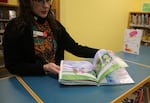It was 2:30 a.m. when alarms went off at the Crook County Public Library in Prineville. A janitor had been carrying a trash can through the door. Inside, a library book was buried in the refuse.
The book, “Sam Is My Sister,” tells the story of a young transgender girl from the perspective of her older brother. Someone had thrown it in the garbage.
It wasn’t the first time an LGBTQ children’s book in the library had been hidden or stolen. Over the past several months, staff members have found books thrown in trash cans, stuffed behind diaper changing stations and hidden behind other shelves. It appeared to be a concerted effort to make these books harder to find.
April Witteveen, the library’s director, said some members of the public will enter the library with a list of LGBTQ-themed books and check all of them out, so that no children can read them.
“It’s guerilla tactics, for sure,” Witteveen said. “Some different ideas come to mind when you think of that word, but that’s what it is — taking matters into your own hands.”

Crook County Librarian Jennifer Fischer holds a book titled "It Feels Good to be Yourself: A Book About Gender Identity." It's one of many LGBTQ books that have come under attack.
Joni Land / OPB
The case of the Crook County Public Library fits with a national trend, one where rumor and innuendo spiral into a full-blown controversy that consumes a community and puts the lives of its queer residents under a microscope.
Buzzy Nielsen of the State Library of Oregon said they’ve seen an increase in efforts to remove books from libraries, according to an annual report. Libraries across the state received 54 challenges to materials in 2022, up from just 20 challenges the year prior. Many times, these books discuss LGBTQ identities and issues of racial justice.
Challenges to these books, the report found, are often tied to national debates about “critical race theory” and the perception that libraries are attempting to promote certain political viewpoints by making these books available. Oftentimes, that means removing books that discuss the lives of LGBTQ people and people of color.
“We’ve seen a really dramatic increase in the challenges to materials like this, and a lot of it is coming from the national level,” Nielsen said.
There’s often a pattern, he said. One or multiple people anonymously complain about materials in a library. The public discussion then snowballs into arguments on social media and then leaks into public forums, where accusations become increasingly conspiratorial.
Groups like Moms for Liberty, a national organization that has a chapter in Central Oregon, orchestrate efforts to remove books that fit these themes. Nielsen said they’re rarely successful, but they do have an impact on the wider discussion of marginalized communities. And that was apparent earlier this month in Crook County.
Nielsen said they’ve also heard more accusations of school district officials avoiding public processes by removing controversial books from their libraries in secret, with Medford School District being one recent example.
He said the State Library of Oregon has reached out to the Oregon Department of Justice for an official opinion to see if these actions are legal.
A rumor
The cycle started in Crook County in May, Witteveen said, when students from nearby Steins Pillar Elementary were scheduled for a tour. The school has no library, so students would borrow books on their visits.
But on that day, the bus did not arrive. Staff had little idea what was happening; they were later notified by email that the school would no longer be sending students to the public library. A school employee later told them it was because a student had borrowed a book about a child drag star.
It’s unclear if the book was actually checked out — both the Crook County School District and the library said they can’t confirm it.
The district has since attempted to distance itself from the issue of queer books. District Superintendent Sara Johnson said she made the sudden decision to end the library tours because parents expressed concern that the district didn’t know what books students borrowed generally or that they might wander into adult sections.
Librarian Jennifer Fischer said teachers would check books students borrowed to make sure they were appropriate for their reading level and that students almost never looked at adult sections of the library.
Johnson declined to answer if parents had brought concerns about any specific books. When asked if she thought it was appropriate for elementary school students to learn about LGBTQ identities, she said that was up to the local community to decide.
An escalation
Whether a student actually borrowed a queer book, the library soon found itself facing intense scrutiny for having these kinds of books in its children’s section.
Angry commenters started flooding library board meetings and patrons would shout at staff members. Some homeschooled families stopped taking their children to the library, Witteveen said.
In one case, librarians said someone returning books yelled at staff and accused them of distributing “child pornography,” an increasingly common mischaracterization of books discussing queer topics.
“We’ve been thrust into a political situation, because of this kind of culture war situation that the country finds itself in right now,” Witteveen said. “This building is an incredible library for a community this size, truly an unbelievable resource. It’s just really hard to be engaged in this and to feel that it’s become so polarized.”
The targeting of the Crook County Library escalated when some people called for segregating all LGBTQ-themed children’s books into their own section, so families would know where those books are located.

Some of the LGBTQ-themed books available at the Crook County Library. An effort to segregate these books to their own section was struck down by the library's board.
Joni Land / OPB
While it sounds innocuous, Witteveen said, it could have been devastating for the library. It could’ve cost them thousands of dollars in federal funding and terminated various partnerships with nearby libraries.
Crook County Library would have lost all of its records, software and many materials currently available to residents without those partnerships. Segregating the books likely would have led to the library shutting down for months while it underwent an expensive internal rebuild, Witteveen added.
While attacks on LGBTQ books don’t often result in a library’s collapse, one Michigan library lost much of its funding after voters twice declined to renew a tax levy. The effort stemmed from the presence of LGBTQ reading materials.
An exit
The Crook County controversy culminated in the library’s board of directors Dec. 8 meeting, where members met to hear a proposal on segregating queer children’s books.
Hundreds gathered to watch and speak on the debate. But after months of fervor, the effort to alienate queer community members stumbled as most speakers opposed the move and said it would amount to censorship.
One of those in attendance was 13-year-old Cairo Wrolson, a non-binary student in Prineville who attended the meeting with their family. Segregating the books, they said, could have created a target on queer children and families.
“Having all of them in one section would make it so like certain people, if they saw you looking at those books might, they might start being rude to you,” Wrolson said. “Kids can be very not nice sometimes.”
Ultimately, the library board voted 4-1 to keep the books where they are.
The effort to segregate the books may have failed, but the library is still feeling the aftershocks. Witteveen recently left her position as library director for a job in Bend. There were a few reasons, but the attack on LGBTQ books had left a toll on her mental health.
“This has been very difficult for me,” she said. “It’s exhausting work … staff are exiting public libraries in significant numbers right now, because of situations like this that are so taxing on mental health.”
Witteveen described her own difficulty having to write a proposal to separate the books when she personally opposed the measure.
And it’s difficult, she said, as a librarian to find any middle ground with those seeking to transform the library — the only one in Crook County — from a place of learning into a political arena.
